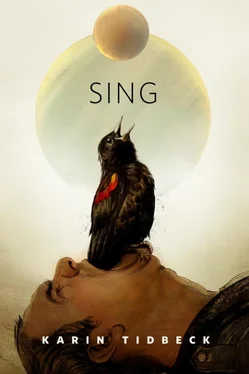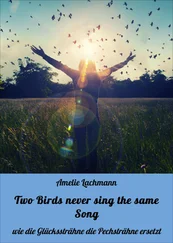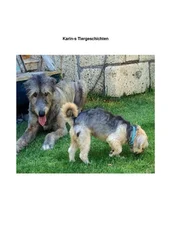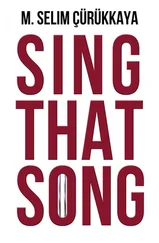“Your ecosystem,” he said eventually, when the path flattened out. “It’s fascinating.”
“What about it?”
“I’ve never seen a system based on parasitism.”
“I don’t know much about that.”
“But you know how it works?”
“Of course,” I said. “Animals lay eggs in other animals. Even the plants.”
“So is there anything that uses the goats for hosts?”
“Hookflies. They hatch in the goats’ noses.”
Petr hummed. “Does it harm the goats?”
“No … not usually. Some of them get sick and die. Most of the time they just get … more perky. It’s good for them.”
“Fascinating,” Petr said. “I’ve never seen an alien species just slip into an ecosystem like that.” He paused. “These hookflies. Do they ever go for humans?”
I shook my head.
He was quiet for a while. We were almost at the village when he spoke again.
“So how long have your people been singing?”
“I don’t know. A long time.”
“But how do you learn? I mean I’ve tried, but I just can’t make the sounds. The pitch, it’s higher than anything I’ve heard a human voice do. It’s like birdsong.”
“It’s passed on.” I concentrated on tensing the muscles in my feet for the next step.
“How? Is it a mutation?”
“It’s passed on,” I repeated. “Here’s the workshop. I can handle it from here. Thank you.”
He handed me the bundle. I could tell he wanted to ask me more, but I turned away from him and dragged my load inside.
* * *
I don’t lie. But neither will I answer a question that hasn’t been asked. Petr would have called it lying by omission, I suppose. I’ve wondered if things would have happened differently if I’d just told him what he really wanted to know: not how we learn, but how it’s possible for us to learn. But no. I don’t think it would have changed much. He was too recklessly curious.
* * *
My mother told me I’d never take over the business, but she underestimated me and how much I’d learned before she passed. I have some strength in my hands and arms, and I’m good at precision work. It makes me a good tailor. In that way I can at least get a little respect, because I support myself and do it well. So the villagers employ me, even if they won’t look at me.
Others of my kind aren’t so lucky. A man down the street hasn’t left his room for years. His elderly parents take care of him. When they pass, the other villagers won’t show as much compassion. I know there are more of us here and there, in the village and the outlying farms. Those of us who do go outside don’t communicate with each other. We stay in the background, we who didn’t receive the gift unscathed.
I wonder if that will happen to Petr now. So far, there’s no change; he’s very still. His temples are freckled. I haven’t noticed that before.
* * *
Petr wouldn’t leave me alone. He kept coming in to talk. I didn’t know if he did this to everyone. I sometimes thought that maybe he didn’t study lichen at all; he just went from house to house and talked people’s ears off. He talked about his heavy homeworld, which he’d left to crawl almost weightless in the high spokes of Amitié. He told me I wouldn’t have to carry my own weight there, I’d move without crutches, and I was surprised by the want that flared up inside me, but I said nothing of it. He asked me if I hurt, and I said only if my joints folded back or sideways too quickly. He was very fascinated.
When Saarakka was up, he typed at me to sing to him. He parsed the cadences and inflections like a scientist, annoyed when they refused to slip into neat order.
I found myself talking too, telling him of sewing and books I’d read, of the other villagers and what they did. It’s remarkable what people will say and do when you’re part of the background. Petr listened to me, asked questions. Sometimes I met his eyes. They had little crinkles at the outer edges that deepened when he smiled. I discovered that I had many things to say. I couldn’t tell whether the biologist in him wanted to study my freakish appearance, or if he really enjoyed being around me.
* * *
He sat on my stool behind the counter, telling me about crawling around in the vents on Amitié to study the lichen unique to the station: “They must have hitchhiked in with a shuttle. The question was from where…”
I interrupted him. “How does one get there? To visit?”
“You want to go?”
“I’d like to see it.” And be weightless , I didn’t say.
“There’s a shuttle bypass in a few months to pick me up,” he said. “But it’d cost you.”
I nodded.
“Do you have money?” he asked.
“I’ve saved up some.”
He mentioned how much it would cost, and my heart sank so deep I couldn’t speak for a while. For once, Petr didn’t fill the silence.
I moved past him from the cutting table to the mannequin. I put my hand on a piece of fabric on the table and it slipped. I stumbled. He reached out and caught me, and I fell with my face against his throat. His skin was warm, almost hot; he smelled of sweat and dust and an undertone of musk that seeped into my body and made it heavy. It was suddenly hard to breathe.
I pushed myself out of his arms and leaned against the table, unsteadily, because my arms were shaking. No one had touched me like that before. He had slid from the stool, leaning against the counter across from me, his chest rising and falling as if he had been running. Those eyes were so sharp, I couldn’t look at them directly.
“I’m in love with you.” The words tumbled out of his mouth in a quick mumble.
He stiffened, as if surprised by what he had just said. I opened my mouth to say I didn’t know what, but words like that deserved something—
He held up a hand. “I didn’t mean to.”
“But…”
Petr shook his head. “Aino. It’s all right.”
When I finally figured out what to say, he had left. I wanted to say I hadn’t thought of the possibility, but that I did now. Someone wanted me. It was a very strange sensation, like a little hook tugging at the hollow under my ribs.
* * *
Petr changed after that. He kept coming into the workshop, but he started to make friends elsewhere too. I could see it from the shop window: his cheerful brusqueness bowled the others over. He crouched together with the weaver across the street, eagerly studying her work. He engaged in cheerful haggling with Maiju, who would never negotiate the price of her vegetables, but with him, she did. He even tried to sing, unsuccessfully. I recognized the looks the others gave him. And even though they were only humoring him, treating him as they would a harmless idiot, I found myself growing jealous. That was novel too.
He didn’t mention it again. Our conversation skirted away from any deeper subjects. The memory of his scent intruded on my thoughts at night. I tried to wash it away in the river.
* * *
“Aino, I’m thinking about staying.”
Petr hadn’t been in for a week. Now this.
“Why?” I fiddled with a seam on the work shirt I was hemming.
“I like it here. Everything’s simple—no high tech, no info flooding, no hurry. I can hear myself think.” He smiled faintly. “You know, I’ve had stomach problems most of my life. When I came here, they went away in a week. It’s been like coming home.”
“I don’t see why.” I kept my eyes down. “There’s nothing special here.”
“These are good people. Sure, they’re a bit traditional, a bit distant. But I like them. And it turns out they need me here. Jorma, he doesn’t mind that I can’t sing. He offered me a job at the clinic. Says they need someone with my experience.”
Читать дальше












